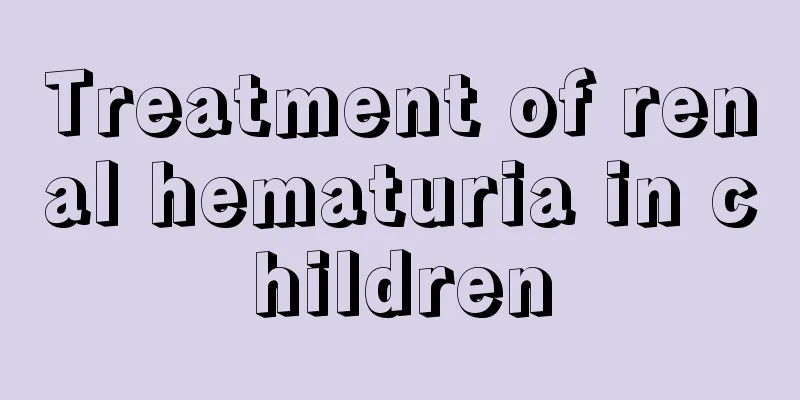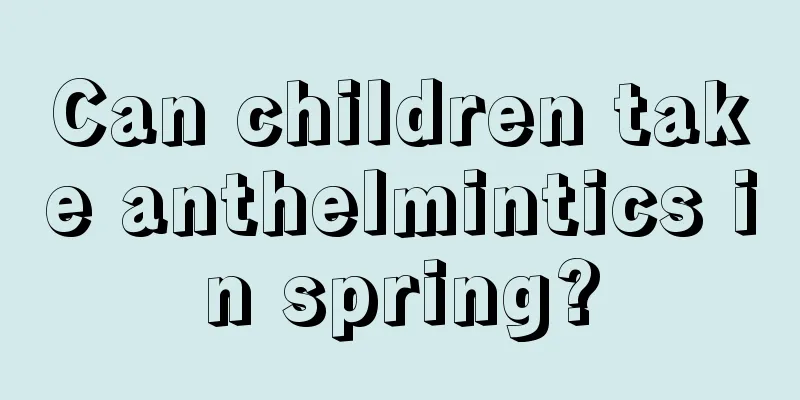Treatment of renal hematuria in children

|
We all know that when children are young, they are very likely to suffer from kidney disease, and kidney disease is very harmful to children. When children have kidney disease, they will have hematuria. If it is the first time to see a child with hematuria, then many parents will definitely be shocked. Children's kidney disease hematuria is a very dangerous disease. We must treat children in time. So how to treat children's renal hematuria? 1. General treatment During the acute phase, you should rest in bed and gradually increase your activity after the clinical symptoms improve. A low-salt diet (less than 3g per day) should be given during the acute phase. People with normal renal function do not need to limit protein intake, but in cases of azotemia, protein intake should be limited, and high-quality animal protein should be the main source. People with oliguria should limit their fluid intake. 2. Treat the infection focus. 3. Symptomatic treatment Diuretic, swelling-reducing, blood pressure-lowering and prevention of complications. 4. Dialysis treatment When acute renal failure occurs and dialysis is indicated, dialysis treatment should be given promptly. Interstitial Nephritis: 1. General treatment The first step in treating interstitial nephritis is to eliminate the cause, control the infection, promptly stop using the sensitizing drugs, and treat the primary disease. 2. Symptomatic supportive treatment Correct renal anemia, electrolyte, acid-base and volume imbalance, significantly elevated blood creatinine or combined with hyperkalemia, heart failure, pulmonary edema and other blood purification indications. Blood purification treatment should be performed in a timely manner clinically. Continuous blood purification treatment can be used for acute interstitial nephritis. For those who enter the uremia stage, kidney transplantation can be performed if conditions permit. (1) Promoting renal tubular regeneration Cordyceps sinensis can promote the growth of renal tubular epithelial cells, improve the stability of cell membranes, and enhance the tolerance of renal tubular epithelial cells to hypoxia. It has a certain therapeutic effect on tubular interstitial nephritis. (2) Immunosuppressants: Interstitial nephritis mediated by immune factors such as autoimmune diseases and drug allergies can be treated with hormones and immunosuppressants. Chronic reflux nephropathy: In some patients with this disease, the glomerular filtration function can remain stable for a long time, while in other patients, the renal function is progressively damaged and they enter renal failure. When the ureterovesical junction matures, 2/3 of the reflux will disappear. Therefore, for patients with reflux, the main treatment is for the infection to prevent damage to the upper urinary tract. At the same time, attention should be paid to and treatment of subvesical obstruction. Antihypertensive treatment is an important aspect of the treatment of reflux nephropathy. Studies have shown that persistent high-grade reflux and urinary tract infection, as well as coexisting hypertension, are factors that promote the progression of renal function damage to end-stage renal failure. Proteinuria is the most important sign of renal impairment. It is now recognized that proteinuria indicates concurrent glomerular disease and may develop progressively in the absence of concurrent infection and hypertension or after surgical correction of reflux. Antireflux surgery does not affect the development of glomerular lesions. Focal segmental glomerulosclerosis is an important factor in the development of this disease to renal failure. Therefore, conservative treatment is considered first for primary ureteral reflux. Surgery to prevent reflux is only considered when the infection recurs after adequate drug treatment and there are lesions in the upper urinary tract. When the diameter of the ureter in the bladder wall is normal, an 8-cm submucosal tunnel can prevent reflux. If the child's hematuria is very serious, then the child should be given timely hemostasis treatment. At the same time, we should avoid adding more burden to the child's health, avoid letting the child eat animal offal, and avoid putting too much psychological burden on the child. If the child has renal hematuria, then we should check what kind of kidney disease the child has, and then treat it in time. If necessary, the child should be given surgical treatment. |
<<: Symptoms of renal hypertension in children
>>: What are the symptoms of zinc deficiency in babies?
Recommend
Four-month-old baby's brain development
For four-month-old babies, they have just started...
Is acupuncture good for myopia in children?
Acupuncture is a treatment method currently used ...
Can a one-year-old baby eat quail eggs?
One-year-old babies can eat quail eggs, mainly be...
Why do children like to bite people?
Mothers really like to communicate about their ch...
At what age do babies start learning to talk?
Every mother feels happy when accompanying her ch...
Why can't the child speak?
After a child is born, he or she begins a long pr...
What to do if your child doesn't like to wear shoes
Shoes are an important protector of children'...
The child has a pimple on his armpit
If you find a lump in your child's armpit, pa...
Garlic and rock sugar water cough baby more than two months old
Garlic, also known as garlic, has the effects of ...
Precautions for newborn air-conditioned room
Newborns are very afraid of cold when they are ju...
Symptoms of zinc deficiency in nine-month-old babies
In life, our daily eating habits often lead to th...
What are the treatments for oral ulcers in children?
In daily life, it is common for children to suffe...
Is it good for children to eat pine nuts?
Pine nuts are a type of food that is rich in nutr...
What causes leg cramps in children?
Many children often tell their parents that they ...
How to deal with children’s nose bleeding due to picking their nose?
Children are prone to nosebleeds, so parents shou...









